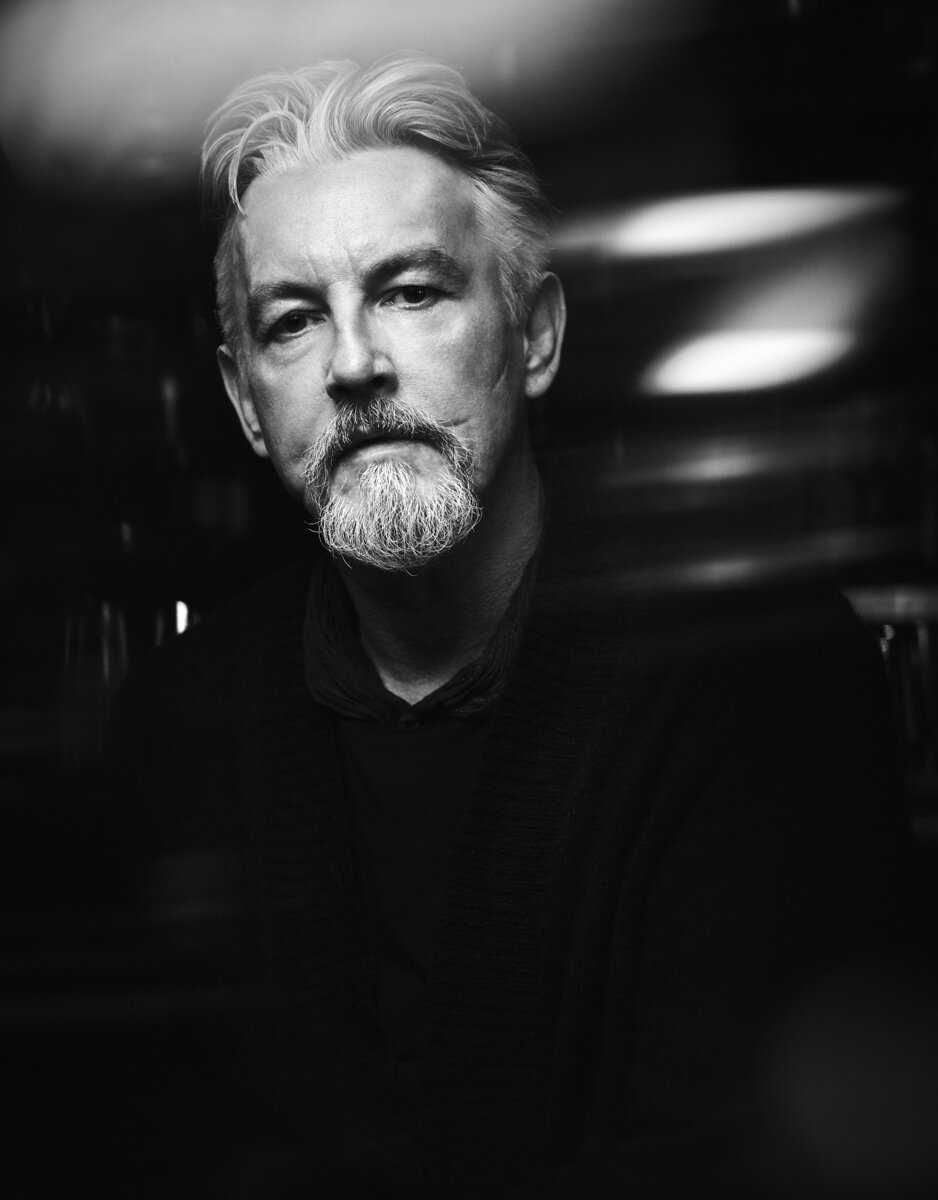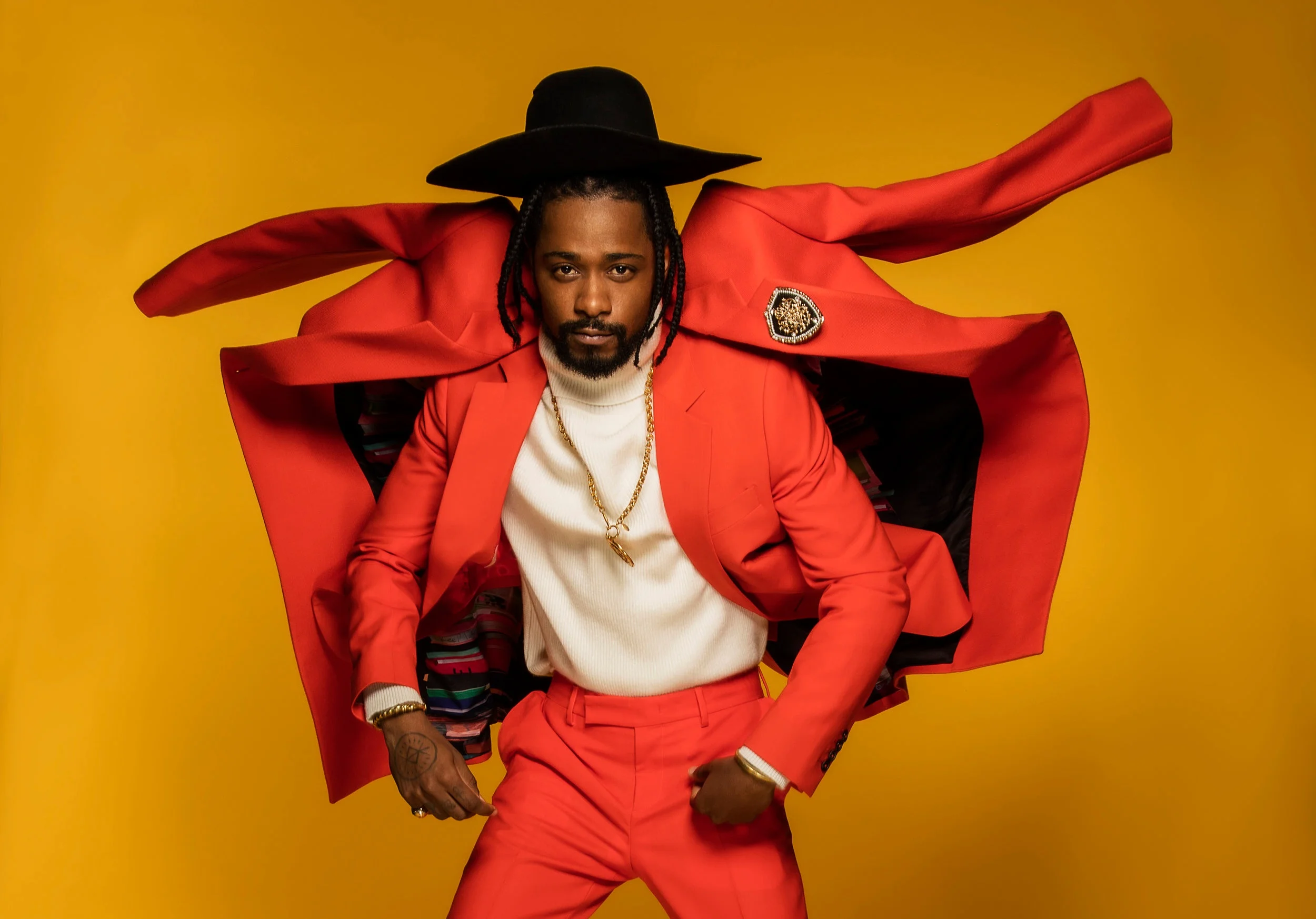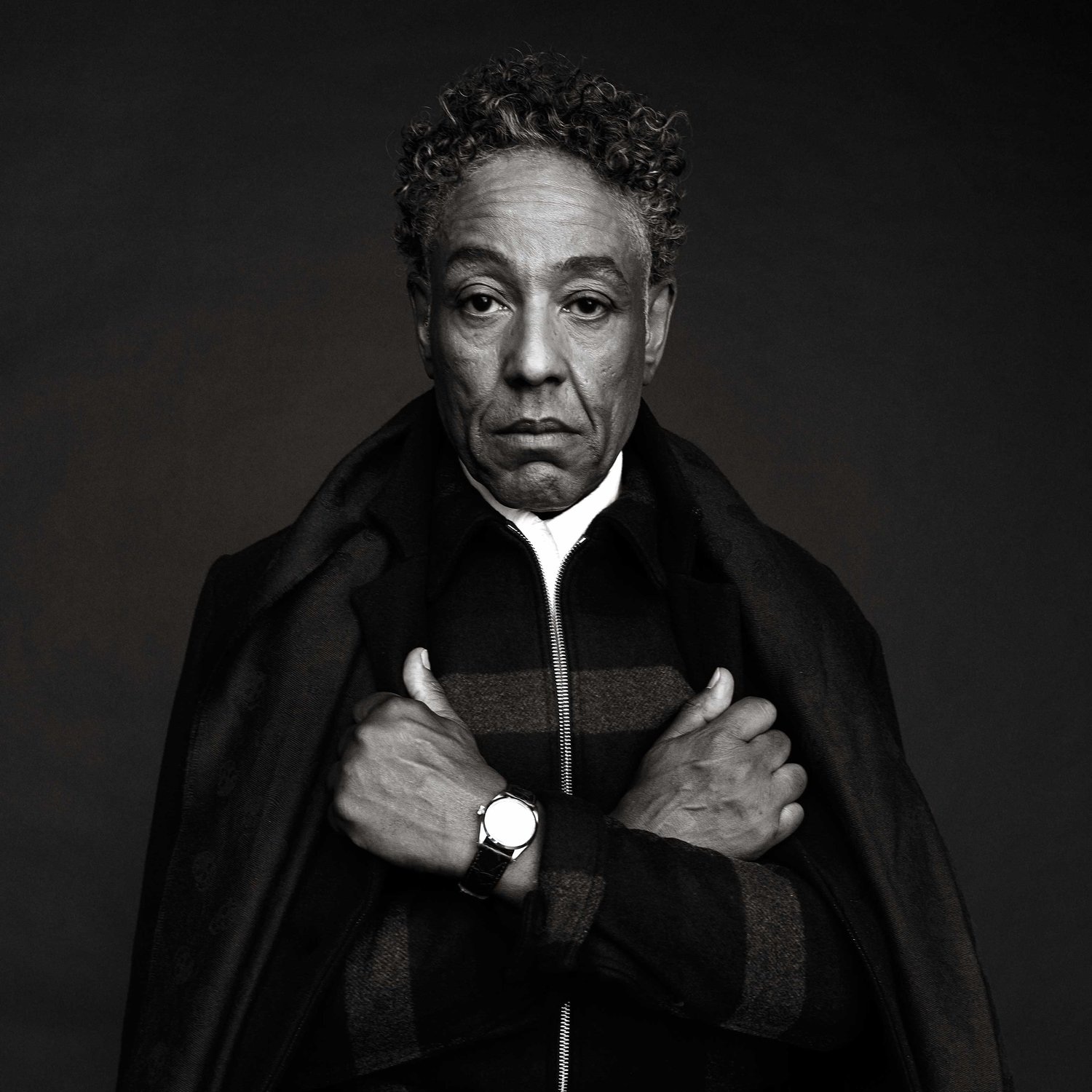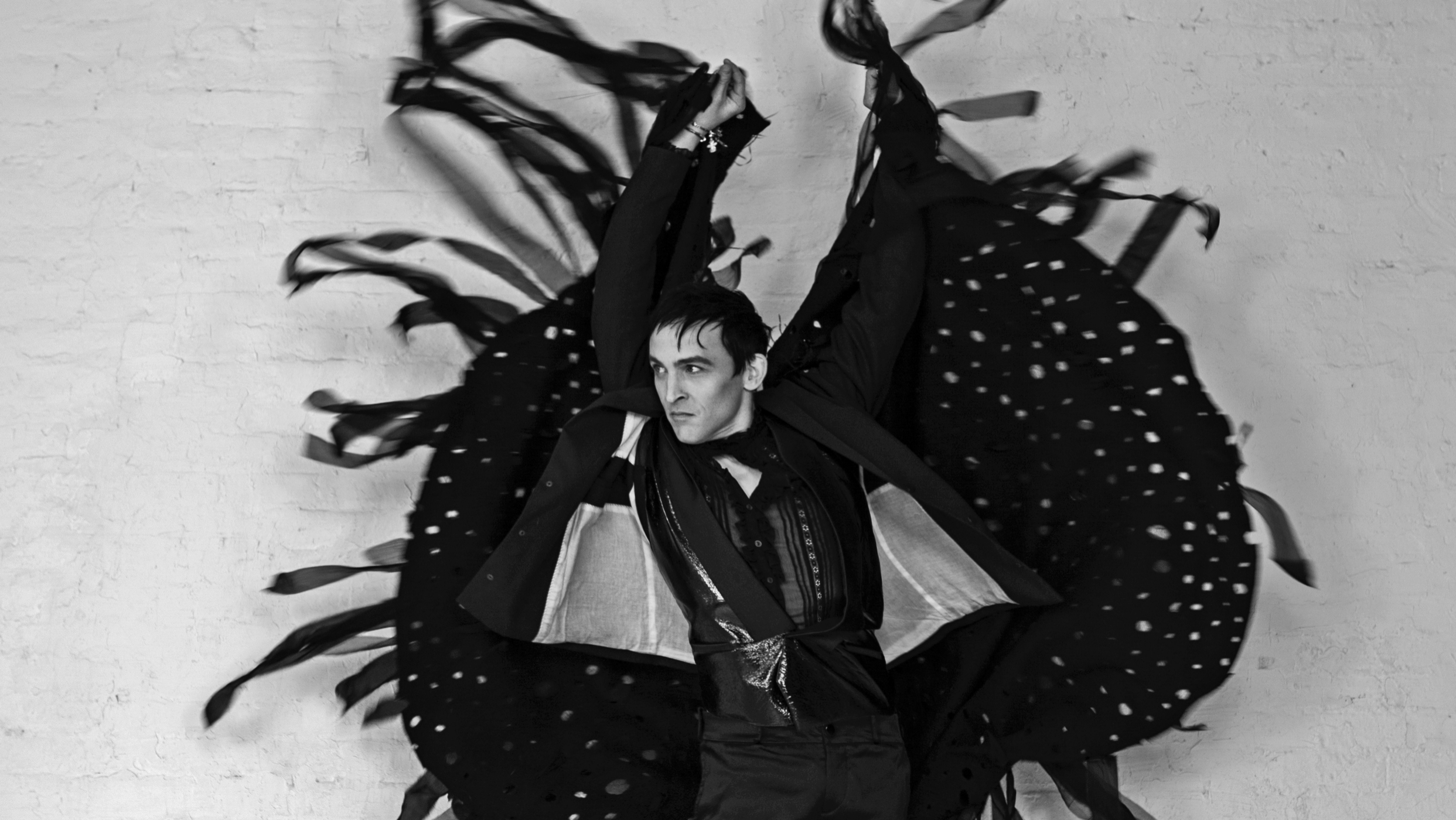Tommy Flanagan
In a bar, actor Tommy Flanagan is turning in circles atop a barstool. Every time he comes round to face the camera he has a different expression. It’s toward the end of the day, at the swanky Hollywood speakeasy No Vacancy. We’re watching Flanagan take a crop of powerful, brooding shots befitting a Scottish character actor. But here, in the home stretch, he spins to keep the energy up. Sometimes his expression is piercing. Sometimes playful. But at their core each look says, ‘I don’t give a fuck.’ And as a result, the photo shoot turns out great.
54 year-old Tommy Flanagan has built a long, successful acting career performing every range of character in legendary projects like Braveheart, Gladiator and Sons of Anarchy. One of his current projects, Adolescence, is an indie film about addiction and connection, in which he co-stars alongside India Eisley and Mickey River. River plays Adam who comes from a tough home life then meets an enigmatic young woman named Alice [Eisley] with whom he enters into a co-dependent relationship. This love opens the door to a world of drugs, music and heroine that Adam steps through, eventually hitting rock bottom. It is there he is befriended by Flanagan’s aging musician Shepherd, who as the name suggests, leads Adam through his recovery.
When we ask Flanagan about playing mentors like Shepherd, he laughs at the question, and responds in his signature Scottish accent, “Mentals maybe.”
With an IMDb page that scrolls for days with impressive roles, taking the role of mentor wouldn’t seem like much of a stretch, but it has been a long distance since his days spinning records in Glasgow. Flanagan knew he wanted to be an actor since, “the day I fell through the door,” he says, but it wasn’t something he pursued till after tragedy struck.
“I DJ’d for many years in Glasgow when I was 20-25. [I] love music. Always loved music. And then something bad happened to me as you can see,” and he gestures, without pity or pain, to the scars running down both sides of his face. If you know Flanagan’s work you know he bears the scars of what is called a Glasgow Smile. He continues, “and then Robert Carlyle, a friend of mine said, ‘why don’t you try acting?’ And I thought, well what have I got to fucking lose? So five weeks later I was on a stage. Terrified… I’ve never been so terrified in my life. Even five guys with knives couldn’t scare me the way my first night on stage did.”
He made it past that first fearful performance and continued acting onstage for a few more years. Then Braveheart happened. “When I met Mel… he dug me so he kinda created this whole character for me. Which was just 5 months of fucking having a laugh in Dublin with the boys,” Flanagan says. “It was fantastic. Horses and spears and swords. Killing the English.”
Acting became his catharsis. “It’s like I got to step away from the world I came from and the trauma that I’d been through and be lost in different characters, which to me was great,” he says. “The escapism was fantastic.”
Flanagan has seen his share of epic, big budget film sets, so I ask about the feeling of working on an indie film like Adolescence. Flanagan gave a nod to Mickey River, who co-wrote the film in addition to co-starring in it. “There was a lot of faith in that script,” he explains. “You never know. It can be a total disaster. But when I saw the page, I thought this kid’s got something here.” He goes on to praise not only River’s acting, but the director Ashley Avis, “she’s got the goods”— and India Eisley — “Jesus Christ that kid can act.” He describes his character Shepherd as a father figure, “trying to engage [Adam] without telling him what to do, engage without ramming it down his throat.” Or as we say, mentor.
When asked about the spark that led to the film, River explains that it came from his “experiences growing up in my life and also things I witnessed growing up through my friends.” River himself is not an addict but saw its harmful effects growing up. Flanagan has more personal experience with addiction, calling it a “scourge” before remarking “it’s the escape.”
“The people I grew up with, there’s a very small percentage—a minuscule percentage actually—that broke away from the slums in Glasgow and actually did something.” Flanagan says, while adding, “I mean of course they did something, I’m not saying they didn’t achieve anything in life, but drugs really decimated the population.”
River makes clear that he was less interested in exploring addiction in this film and more interested in exploring the balm to addiction —the connection between people. “When I wrote this I really wanted to make every single character just human. Because we all make mistakes, we all go through life making mistakes and it doesn’t make us bad, it doesn’t make us good, we’re just people,” he says. “Some other films will depict ‘you’re the antagonist, you’re the protagonist. Because you did that.’ But I don’t believe that. I believe that we all go through stuff in our lives and we can either learn and grow from that, or, we can grow from that later in life. Maybe not at the same time as everyone else is doing it. So I really wanted to show that, because it’s a film about growing up. Whatever age you are. It doesn’t matter. We all grow up.”
While we all grow, some things don’t change, we don’t want them to change. For Flanagan, the respect and reverence for being on set hasn’t changed even after decades of being on it. While sets themselves have evolved since the Nineties—one thing doesn’t change for him: no phones on set. “I refuse to have my fucking phone on set! You’re given this world to play in, and it’s fucking amazing,” he exclaims. “You’re being an actor and you have this whole fucking thing going on. It’s a great story—and you wanna be sitting there Tweeting about your dog’s fucking shits or something?! Enjoy the moment, enjoy the movie. This fucking job— it’s a love. Without a doubt, it’s a love. If you don’t love this then why else would you do it?”
Flanagan has spent the last two decades making a lucrative career out of doing what he loves. And now, he can add “Producer” to the list of things he loves to do. He’s currently producing his own TV show, Rockport, which he juggled among the TEN other projects he has on his slate, including an appearance in the upcoming Season 3 of Westworld. As though that wasn’t enough, he’s next opening a Motorcycle Cafe in his current hometown of Malibu, aptly called Malibu Cafe Racer, inspired by his SOA days.
Speaking about Malibu, while Flanagan was away in Vancouver filming the recent Netflix series Wu Assassins [released this August] massive Southern California wildfires ravaged Malibu. Flanagan’s voice takes on a tightness as he recalls the day. “We were in this forest in the middle of fucking nowhere and I’m shooting this huge monologue, as I’m getting all these phone calls, and so I think I’ve lost everything: my horses, my home, all of my baby stuff, everything’s gone. And [in that scene] one of the assassins throws a ball of fire at me and it burns my face, and my opening line to this monologue is, ‘there’s nothing like a good burn to regenerate growth.”
Flanagan claps his hand as if to say, you can’t write this shit. “I was such a wreck, and luckily I had my wife and daughter with me, thank God, but just for those moments of filming— I was lost in there.” Flanagan chides himself, “I sound like a wanker but it’s true. You can lose yourself in this character. And for those little minutes where you’re on screen and you’re in your own head and you’re being who you’re being, it was great escapism… it has been a lifesaver for me.”
The last time he used the word escape he was using it to describe addiction but now it was saving his life, so has surviving trauma influenced or informed Flanagan’s acting? “I think it gives you an edge in the way that you’re not afraid to take chances. Even to this day I’m still not afraid to take chances. Never have been… what you gotta lose?” With a smile, he adds, “Until my daughter was born and then… it’s a bit different now.”
I note how love and trauma keep coming up, how they can go hand in hand. “One kinda creates the other,” Flanagan replies. “Through trauma hopefully you’ll find some sort of love. Like I did, I went through some severe trauma, but the love I got was doing this job.”
“Whatever you wanna do in life, just do it, because you’re here once,” River adds. “I think fear is this huge thing that keeps us from doing things that we really want to do. What is that Jim Carrey quote? ‘You can fail at what you don't want, so you might as well take a chance on doing what you love.’”
Writer: Alexandra Henrikson
Photography: MK McGehee
Styling: Eric Owes
Grooming: Amber Amos @The Only Agency
Lighting/Digital Tech: Alexander Fenyves
Location: No Vacancy









